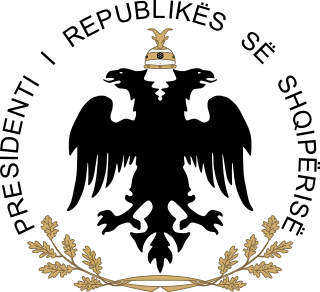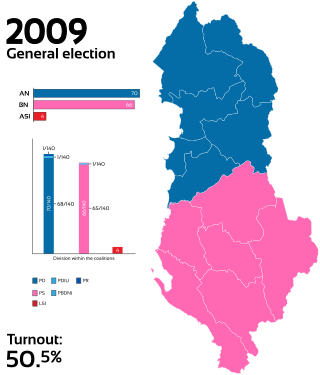| |||||
| Decades: | |||||
|---|---|---|---|---|---|
| See also: | Other events of 2009 List of years in Albania | ||||
The following lists events that happened during 2009 in Republic of Albania .
| |||||
| Decades: | |||||
|---|---|---|---|---|---|
| See also: | Other events of 2009 List of years in Albania | ||||
The following lists events that happened during 2009 in Republic of Albania .

Sali Ram Berisha is an Albanian cardiologist and conservative politician who served as the president of Albania from 1992 to 1997 and 32nd prime minister from 2005 to 2013. Berisha serves as Chairman of the Democratic Party of Albania since 2022 and has held the position previously from 1990 to 2013. He also serves as the incumbent Leader of Opposition in the Albanian parliament.

The president of Albania, officially styled the President of the Republic of Albania, is the head of state, commander-in-chief of the military and the representative of the unity of the Albanian people.

Edi Rama is an Albanian politician, painter, writer, former university lecturer, publicist and former basketball player, who has been serving as the 33rd and incumbent Prime Minister of Albania since 2013 and chairman of the Socialist Party of Albania since 2005. He was appointed Minister of Culture, Youth and Sports in 1998, an office he held until 2000. First elected mayor of Tirana in 2000, he was reelected in 2003 and 2007.

Fatos Thanas Nano is an Albanian socialist politician who served as Prime Minister of Albania in 1991, from 1997 to 1998 and from 2002 to 2005. He was the first leader and founder of the Socialist Party of Albania and a member of the Albanian Parliament from 1991 to 1993 and 1997 to 2009. He reformed the anti-revisionist Marxist-Leninist ideology of the Labor Party of Albania into social democracy for its successor, the Socialist Party. During his leadership, the Socialist Party, as a result of reforms, joined the Socialist International and Party of European Socialists. Nano was a candidate in the 2007 presidential election but did not win. He again tried in the 2012 presidential election, but he did not even qualify as a candidate, because the leaders of parties in Parliament obstructed their respective MPs to elect him as candidate in the elections.

The Democratic Party of Albania is a conservative political party in Albania. It has been the largest opposition party in the country since 2013.

Ilir Rexhep Meta is an Albanian politician. He served as the president of Albania from 24 July 2017 to 24 July 2022.

Parliamentary elections were held in Albania on 3 July 2005. The result was a victory for the opposition Democratic Party (PD) and its allies, prominently the Republican Party (PR). Former president Sali Berisha became prime minister as a result of the election.
The fall of communism in Albania, the last such event in Europe outside the Soviet Union, started in December 1990 with student demonstrations in the capital, Tirana, although protests started in January that year in other cities like Shkodra and Kavaja. The Central Committee of the communist Party of Labour of Albania allowed political pluralism on 11 December and the largest opposition party, the Democratic Party, was founded the next day. March 1991 elections left the Party of Labour in power, but a general strike and urban opposition led to the formation of a "stability government" that included non-communists. Albania's former communists were routed in elections in March 1992 amid economic collapse and social unrest, with the Democratic Party winning most seats and its party head, Sali Berisha, becoming president.
In 1991, the Socialist Party of Albania, with specific social democratic ideology took control of the country through democratic elections. One year later the Democratic Party of Albania won the new elections. After 1990, Albania has been seeking a closer relationship with the West. What followed were deliberate programs of economic and democratic reform, but the implementation of capitalism led to the proliferation of pyramid schemes. Chaos in late 1996 to early 1997, as a result of the collapse of these pyramid schemes, alarmed the world and prompted the influx of international peacekeeping forces. In 1995, Albania was accepted into the Council of Europe and requested membership in NATO and is a potential candidate country for accession to the European Union. The workforce of Albania has continued to emigrate to Western countries, especially Greece and Italy.
Parliamentary elections were held in Albania on 24 June 2001. The result was a victory for the ruling Socialist Party of Albania, which won 73 of the 140 seats, resulting in Ilir Meta remaining Prime Minister. Voter turnout was 54%.

Parliamentary elections were held in Albania on 28 June 2009. No alliance achieved 71 deputies on its own needed to form a parliamentary majority. A coalition government was formed by the Democratic Party and Socialist Movement for Integration.

Petrit Vasili is an Albanian politician. He was the chairman of Socialist Movement for Integration party and minister of health in the cabinet of Sali Berisha.

The 2011 Albanian opposition demonstrations were a series of Antigovernment protests in cities around Albania following 18 months of political conflict over alleged electoral fraud by the opposition. A video surfaced which portrayed the deputy prime minister arranging a corrupt deal with the minister of economy. The public outcry over the video resulted in the resignation of the deputy prime minister, Ilir Meta. A demonstration was called by parliamentary opposition parties, which include the Socialist Party and the Unity for Human Rights Party. These were called on 21 January in order to protest the alleged corruption of the Albanian government as well as widespread unemployment and poverty in the country.
The following lists events from the year 2011 in Albania.
The following lists events that happened during 2013 in the Republic of Albania.
The following lists events that happened during 2010 in Republic of Albania.
The following lists events that happened during 2008 in Republic of Albania.

In Albania the Berisha II Government was in office from 2009 to 2013. They were sworn in on 17 September 2009, replacing the Berisha I cabinet, which had been in office since 2005. They were followed by the Rama cabinet on September 15, 2013.
Parliamentary elections are scheduled to be held in Albania by June 2025.
Events in the year 2023 in Albania.